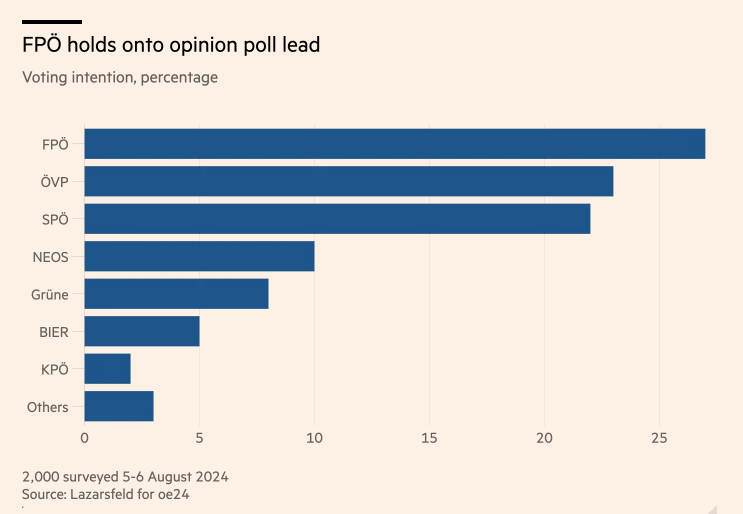Austria heads to the polls
The little alpine nation is voting this weekend. To this amateur observer, the result seems already clear.

This weekend, Austrians will head to the polls. My wording is carefully chosen as many people who work, live and pay taxes in Austria will not be voting. In order to vote in Austria, one must be an Austrian citizen, and Austrian citizenship is one of the hardest in the world to apply for. The criteria are demanding, the process is expensive, and no dual citizenship is permitted. A local newspaper reported recently that approximately 20% of residents of Austria of voting age cannot vote here due to their nationality. In cities like Vienna, I believe the figure is as high as 1 in 3 adults.
In other words, the election this weekend will be a reflection of what Austrian citizens want for Austria, with a huge number of long-term residents and taxpayers not represented.
The voting age here is as low as 16. My eldest missed the deadline to register to vote from abroad (he is 18 and in the U.S.; the deadline was over 7 weeks before the election. My 16 year old will vote for the first time this Sunday. At her school, representatives from what are expected to be the top five parties in Sunday’s vote held a live debate, and I am told the “edits” are circulating on TikTok. This certainly helped her make up her own mind about who she planned to vote for. To be honest, though, I do think a 30 year-old working full time should have a priority in voting over my 16 year-old who has only ever known school life and hasn’t even had her first job here yet. But this is how the system steers power towards those with the golden passport. So it is democracy, but with a caveat. And as the years go on, the asterisk grows larger.
TL;DR — my unscientific view (I have not watched a single debate or TV interview due to now living, very happily, without a TV) is the far right FPÖ will come in a solid first place, and the conservative ÖVP, currently in government, desperate to hold onto power, will enter into a coalition despite now saying over and over that they don’t want to get into bed with Kickl (party leader far right FPÖ). The ÖVP already governs three regions of Austria together with the FPÖ, and have governed before with them on the federal level. Even though publicly it is popular to talk about Kickl as a “no go” zone due to his particularly strong, xenophobic rhetoric and fear that he would take the country on an even more undemocratic course, I believe a conservative-far right coalition is a god given.
There is so much out there, far too many hours of podcast episodes for even me to listen to, so I will share with you some of the highlights if any of you are curious to learn more about Austria’s upcoming election.
One theory is that if the ÖVP, SPÖ and Neos (liberal, reform-oriented party) come in second, third and fourth place respectively, that they could try and form a three-way coalition. This is an interesting hypothesis, but I believe it to be unrealistic. This Der Standard “Inside Austria” podcast together with Der Spiegel takes a look and how that might look. I think given the animosity between the conservative ÖVP and the socialist SPÖ (who, in my personal opinion, are greatly weakened by their current leader who was fit for local office but not to lead on a national scale), a three-way coalition could only be a possibility if Austria’s president were to intervene and ban Kickl from becoming chancellor. The big question, is, would he? Personally, if you are really a democracy, and Austria does have direct parliamentary elections and functions as a multiparty system, I don’t see how you can prevent the leader from a party earning 30%+ of the public vote from ruling, and still call yourself a democracy. Even if his views are radical and he reminds many people of dark pages of Austria’s history books. If you listen to Kickl’s speeches, even his intonation is the same.
To see what the modern far right looks like, the Austrian version, take a look at this video from a beer tent in Upper Austria on May 1:
Kickl himself says he will be a “Volkskanzler”, but denies he is referring to the Nazi period with this name. It remains a provocative statement, as everyone understands what exactly he means when he says this. When Ukrainians ask me what I expect to happen after the election, I reply simply “the fascists will win”. They look at me, stunned. For more on Kickl the man, I would recommend this excellent thread on “X” in English on “who is Kickl”? by Marcus How:
Now, it is hard to say how a win by the far right would impact, at least initially, a city like Vienna, home to 2+ million, governed for the past 100 years by socialists, now in coalition with the “liberal” Neos. But Vienna has real problems now, which are stemming from its generous social programs now extending to huge numbers of recent immigrants, many of whom leave other parts of Austria and come to Vienna specifically because of the social programs for families with children. In other words, the local ÖVP and FPÖ are not wrong when they argue that for some families with lots of kids from Syria or Afghanistan in Vienna, it does not pay to work. I think much of “social democratic” Europe struggles with how to preserve its safety net for locals in need while not being overrun with new arrivals who have done the math and smell opportunity. Vienna’s schools even opened container classes this fall as so many children arrived from Syria to join their fathers who landed here years prior. It is not uncommon to get on Vienna public transport these days and see more women with headscarves than not. This is something I myself notice, not out of racism, as an observation. I do think this will impact how some people vote. People will vote in protest if they do not feel like their home looks how it did ten, twenty years ago. For others, sure, it is sign of inclusivity and progress, but I fear those voters are in the minority.
The floods Austria experienced this September may nudge some to give their votes to the Greens whose only platform really seems to be the climate crisis. But, as the junior partner in the current government, they have only had moderate success in implementing their polities, and they lack charismatic leadership. I would frankly expect them to come in 5th. Other parties running include the communists (think bobos in sneakers and ageing hippies), and a beer party led by a charismatic young guy whose dad apparently finances the party.
This is a very good summary by the FT of what is at stake as Austria votes:
Austria, the far right, and Russia
Since the FT piece was published, Austria’s ÖVP finance minister was just named EU “migration chief”, a big job he arguably has no experience for. When I read the news, I wondered if he has ever in his life spoken with an actual immigrant (really). Austrians know Brunner for having lost his driver’s license for 4 weeks last January for massively exceeding the speed limit in his home region of Vorarlberg. This big new role puts Austria in the limelight as the EU tries to figure out how it is going to deal with immigration going forward.
There are many excellent podcasts on Austrian politics, put out by the top journalists covering the issues. There is even a new series entirely dedicated to tracking Russia’s long-term influence and Austria’s gas drip dependence. I have not had time to listen to them all but share the links here. All in German, I’m afraid.
Profil — Putin: Die Langzeitbeziehung on Austria’s “toxic relationship” with Russia
Inside Austria by SPIEGEL & Standard
Die Presse — Was bei dieser Wahl wichtig ist
In this last week before Austria votes, Putin’s friend Hungarian leader Viktor Orban is busying making scare-tactic headlines, announcing plans to build a camp for refugees just 15km from Austria’s border. It’s a page out of the Kremlin handbook.
In summary, I don’t know how long we will have to wait after Sunday for the parties to enter into coalition-buildling talks, but my money, if I was a betting woman (I am not), would be on a ÖVP-FPÖ coalition provided Austria’s president does not intervene. This is a really tricky one to predict. From this article (via Google translate):
"The constitution gives the Federal President a wide range of discretion," says constitutional and administrative law expert Peter Bußjäger. "He must keep in mind what the most promising course of action is for a stable government." A strong Federal President was deliberately anchored in the constitution.
I really do think, though, that if democracy is the goal, one cannot wipe away the person 30% of the electorate voted for, simply because many fear he is undemocratic and racist. Nearly half of America voted for Trump, and he served his four years, without intervention.
Note: hit “publish” on this too fast. Wanted to conclude by sharing this opinion piece by Hans Rauscher which argues that an FPÖ-ÖVP coalition is “not far off”.




